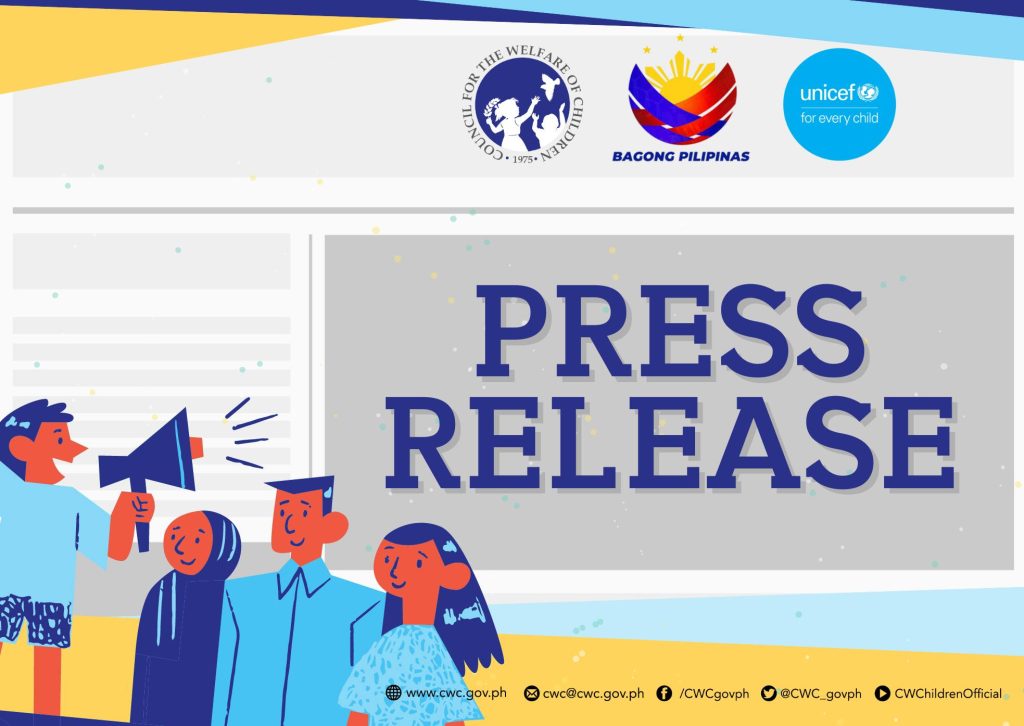
𝐏𝐫𝐨𝐭𝐞𝐜𝐭𝐢𝐧𝐠 𝐭𝐡𝐞 𝐫𝐢𝐠𝐡𝐭𝐬 𝐨𝐟 𝐞𝐯𝐞𝐫𝐲 𝐜𝐡𝐢𝐥𝐝: 𝐓𝐡𝐞 𝟒𝐭𝐡 𝐍𝐚𝐭𝐢𝐨𝐧𝐚𝐥 𝐏𝐥𝐚𝐧 𝐨𝐟 𝐀𝐜𝐭𝐢𝐨𝐧 𝐟𝐨𝐫 𝐂𝐡𝐢𝐥𝐝𝐫𝐞𝐧 𝐮𝐧𝐯𝐞𝐢𝐥𝐞𝐝
𝑀𝐴𝑁𝐼𝐿𝐴, 3 𝐽𝑢𝑙𝑦 2024 — The Council for the Welfare of Children, with UNICEF support, today announced the approval of the 4th National Plan of Action for Children for 2024-2028, which will level up protection of the rights of children in the Philippines, including the most vulnerable.
This comprehensive plan, developed with government agencies, civil society organizations, children, and development partners, closes critical remaining gaps in existing national strategies and frameworks. They include:
![]() 𝐂𝐡𝐢𝐥𝐝 𝐏𝐫𝐨𝐭𝐞𝐜𝐭𝐢𝐨𝐧: By establishing robust protection systems across the country, the plan will focus on creating a safe, nurturing environment for children.
𝐂𝐡𝐢𝐥𝐝 𝐏𝐫𝐨𝐭𝐞𝐜𝐭𝐢𝐨𝐧: By establishing robust protection systems across the country, the plan will focus on creating a safe, nurturing environment for children. ![]() Robust means effective laws and policies, good governance, preventive and response services, clear standards and checks, sufficiently trained staff, with funding.
Robust means effective laws and policies, good governance, preventive and response services, clear standards and checks, sufficiently trained staff, with funding.
![]() 𝐂𝐡𝐢𝐥𝐝 𝐏𝐚𝐫𝐭𝐢𝐜𝐢𝐩𝐚𝐭𝐢𝐨𝐧: This is a standout feature as children’s voices and perspectives were central to initiatives designed to protect and empower them.
𝐂𝐡𝐢𝐥𝐝 𝐏𝐚𝐫𝐭𝐢𝐜𝐢𝐩𝐚𝐭𝐢𝐨𝐧: This is a standout feature as children’s voices and perspectives were central to initiatives designed to protect and empower them. ![]() Children were not passive beneficiaries; they were active contributors to their own well-being.
Children were not passive beneficiaries; they were active contributors to their own well-being.
![]() 𝐂𝐥𝐢𝐦𝐚𝐭𝐞 𝐂𝐡𝐚𝐧𝐠𝐞: Recognizing the urgent issue of climate change, the plan integrates climate resilience strategies. It aims to protect children from immediate threats and prepare them for future challenges.
𝐂𝐥𝐢𝐦𝐚𝐭𝐞 𝐂𝐡𝐚𝐧𝐠𝐞: Recognizing the urgent issue of climate change, the plan integrates climate resilience strategies. It aims to protect children from immediate threats and prepare them for future challenges. ![]() This forward-thinking approach not only mitigates risks but also promotes long-term health, safety, and stability for children as they grow up in an increasingly unpredictable environment.
This forward-thinking approach not only mitigates risks but also promotes long-term health, safety, and stability for children as they grow up in an increasingly unpredictable environment.
The plan also responds to the directive of President Ferdinand R. Marcos Jr. to adopt a holistic approach to combat online sexual abuse and exploitation of children and child sexual abuse and exploitation materials.
The Council of Welfare of Children Executive Director Angelo Tapales said, “Today marks a significant milestone for children in the Philippines with the approval of the 4th National Plan of Action for Children 2024-2028. With UNICEF’s support, we are committed to enhancing child protection, amplifying children’s voices, and fortifying resilience against climate change. This plan underscores our unwavering dedication to securing a brighter future for every Filipino child.”
UNICEF Country Representative Oyunsaikhan Dendevnorov said: “We are committed to ensuring that the 4th National Plan of Action for Children is fully implemented. It is not just a plan on paper. We thank the Council of Welfare of Children for recognizing the importance of strengthening systems. Now, the Philippines will no longer have a fragmented approach, but instead a united way forward to safeguard child rights.”
The current plan places more emphasis on systems strengthening as a core change strategy. Working on child protection cuts across several line agencies, making coordination even more important: in developing joint action plans with clear roles and responsibilities on who does what; aligning activities, and monitoring progress.
The Council and its regional counterparts will assist local government units to ensure alignment of the National Plan of Action of their local development plans for children, local investment plan for children, local codes for children and local state of children’s reports.
UNICEF will support with clear guidance on how to roll out and budget for child protection systems at the national and sub national level. This will strengthen prevention, response, and rehabilitation measures for all children at risk and who have experienced all forms of abuse, violence, and exploitation.
The previous five-year plan, which set the stage for child protection, was commended by the UN Committee on the Rights of the Child for being rights-based and participatory in its conduct. A total of 17 Regional Plans of Actions for Children followed, guiding regional committee members on how to assist local government units on the welfare of children.
𝐍𝐨𝐭𝐞𝐬 𝐭𝐨 𝐭𝐡𝐞 𝐄𝐝𝐢𝐭𝐨𝐫:
https://situationofchildren.org/ph is a new generation situation analysis in the Philippines that uses data, risk analysis and findings from research, evaluations, and validations. This situation analysis provides critical insights into the needs and challenges faced by vulnerable children, ensuring key documents are based on quality evidence, such as the 4th National Plan of Action for Children, other policies and programming for children.
𝐅𝐨𝐫 𝐦𝐨𝐫𝐞 𝐢𝐧𝐟𝐨𝐫𝐦𝐚𝐭𝐢𝐨𝐧, 𝐩𝐥𝐞𝐚𝐬𝐞 𝐜𝐨𝐧𝐭𝐚𝐜𝐭:
𝗖𝗼𝘂𝗻𝗰𝗶𝗹 𝗳𝗼𝗿 𝘁𝗵𝗲 𝗪𝗲𝗹𝗳𝗮𝗿𝗲 𝗼𝗳 𝗖𝗵𝗶𝗹𝗱𝗿𝗲𝗻:
Joanna Camille R. Jacinto-Lizardo, Information Officer IV/Head of Public Affairs and Information Office, paio@cwc.gov.ph, +63 8461-66-20 loc. 1005
𝗨𝗡𝗜𝗖𝗘𝗙 𝗣𝗵𝗶𝗹𝗶𝗽𝗽𝗶𝗻𝗲𝘀:
Lely Djuhari, Chief of Advocacy and Communication, ldjuhari@unicef.org, +63 917 567 5622
Margaretha Francia, Advocacy and Communication Specialist mfrancia@unicef.org +63 917 858 9447
𝗔𝗯𝗼𝘂𝘁 𝗨𝗡𝗜𝗖𝗘𝗙
UNICEF promotes the rights and wellbeing of every child, in everything we do. Together with our partners, we work in 190 countries and territories to translate that commitment into practical action, focusing special effort on reaching the most vulnerable and excluded children, to the benefit of all children, everywhere.
For more information about UNICEF and its work for children in the Philippines, visit www.unicef.ph.Follow UNICEF Philippines on Facebook, Instagram, LinkedIn, TikTok and Twitter and YouTube.

